
The sustainability of the Arocs is a real trump card for Devagro
Economics & Logistics
By using climate-friendly, environmentally responsible concrete, Devagro wants to set the benchmark in their industry. The Arocs fits perfectly with this project.
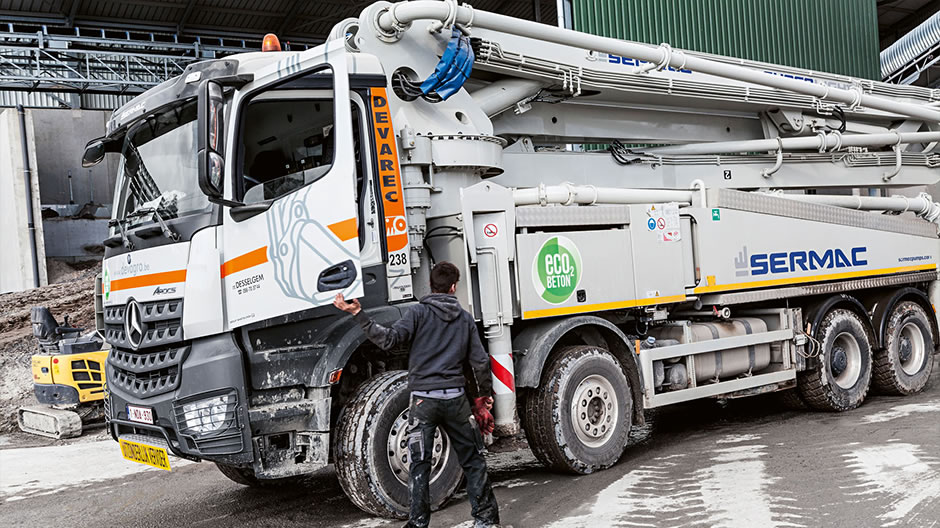
Versatile. Even when carrying a concrete pump, the Arocs performs impressively at Devagro.
Concrete without water and cement? No problem at all! This recipe is actually much more environmentally friendly than the conventional variant. Manufacturer Devagro calls this innovative material ECO2beton. The company prepares the mixture at its new, ten-hectare plant on the river Leie in Desselgem, where the Arocs can be seen regularly coming and going. "This type of concrete could mark a definitive change for all infrastructure works," explains Ignace Degezelle, who, together with his sons Yves and Xavier, head the family-run group.
At ECO2beton, water is replaced by a gel, which has the effect of creating a material which is virtually shrink-free and whose scale can thus be reduced by up to 20 percent. And instead of cement, a geopolymer is used which comes from recycled concrete granulate. By not having to use limestone, whose mining produces immense amounts of CO2, the climate footprint of ECO2beton is excellent. Furthermore, the new construction material is acid-free and is therefore particularly well-suited for use in agricultural applications and the food industry.
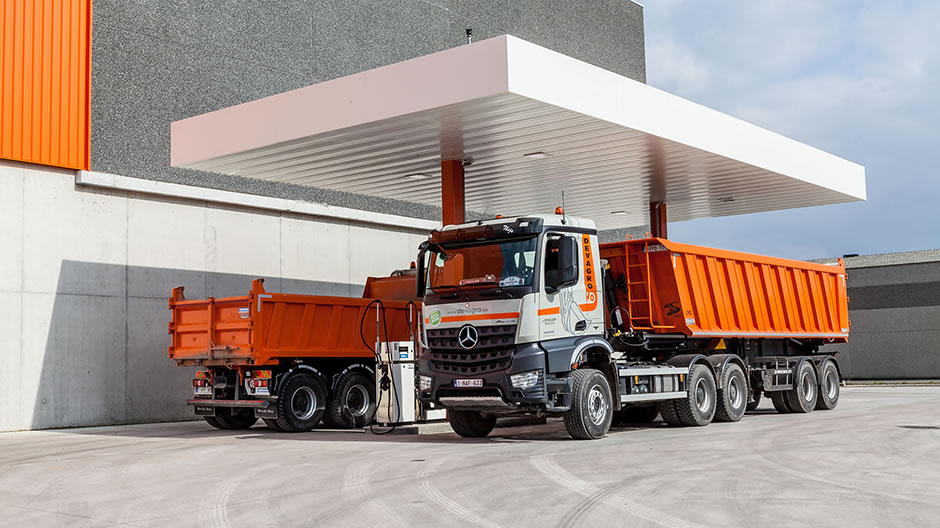
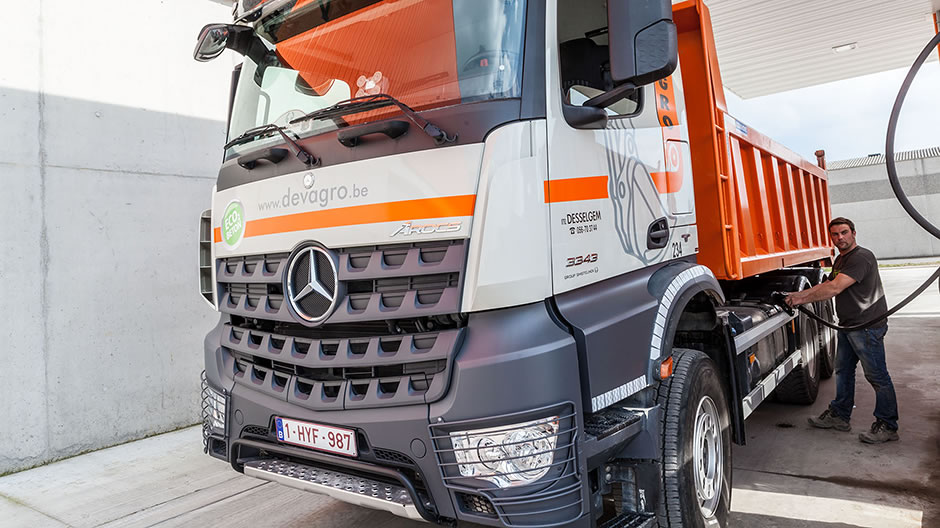
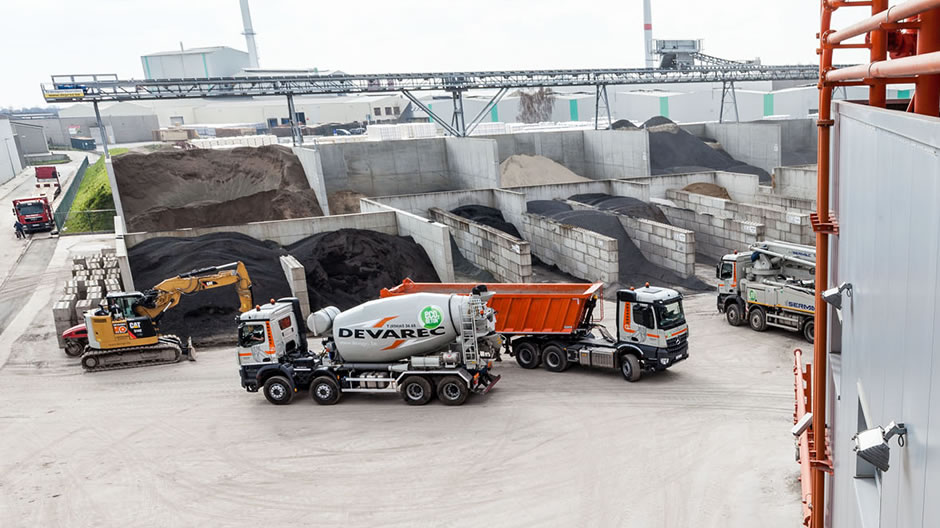
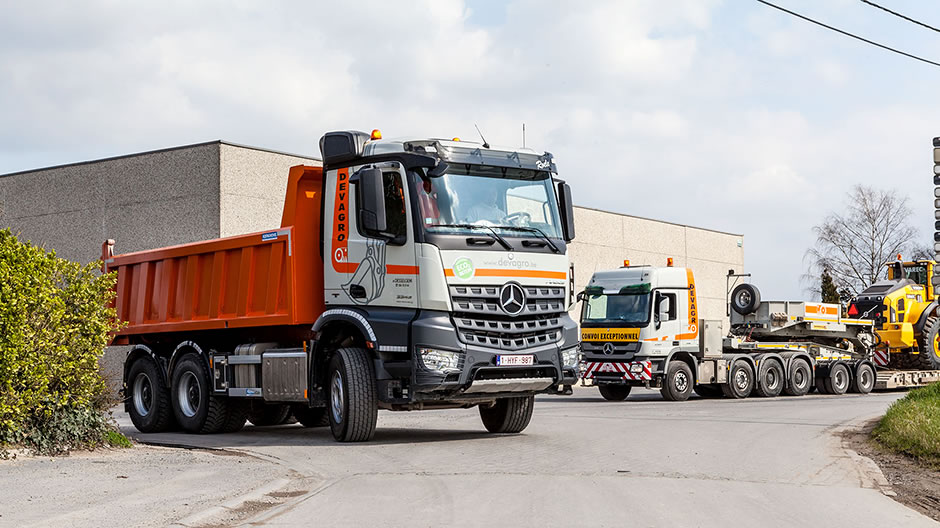
Devagro is an acronym of "Degezelle", "Vanden Buverie" and "Grondwerken". Background: Ignace Degezelle established his company together with his father-in-law, who was already working in the construction branch. Today, the group also owns the companies Devarec, Devamix, BSV (Bodem Sanering Vlaanderen) and GR Westkust. The spin-off companies of Devagro, founded in 1989, all perform work closely related to the basic activities of the parent group.
"Devarec was created in 1994, because the prices for our public-sector work orders were put under immense pressure and the only way to achieve the lowest price for tenders was to handle the recycling aspect ourselves," explains Ignace Degezelle. "In 2000, we then founded Devamix and BSV for soil remediation by creating our own purifying station for soil in the town of Harelbeke. And in order to also offer these operations successfully in the western part of West Flanders, in 2004 we also took over GR Westkust."
Devarec Eco2, founded last year, will now become the show-piece of the Devagro group. After all, its ECO2beton (literally: ECO2concrete) product is setting benchmarks in sustainable construction. "It's basically an analogy of the so-called Bijna Energie Neutraal-Häusern (almost energy-neutral houses), BEN for short. Alongside it's improved carbon footprint, this type of concrete is incidentally also subject to less wear resulting from water ingress," highlights Ignace Degezelle.
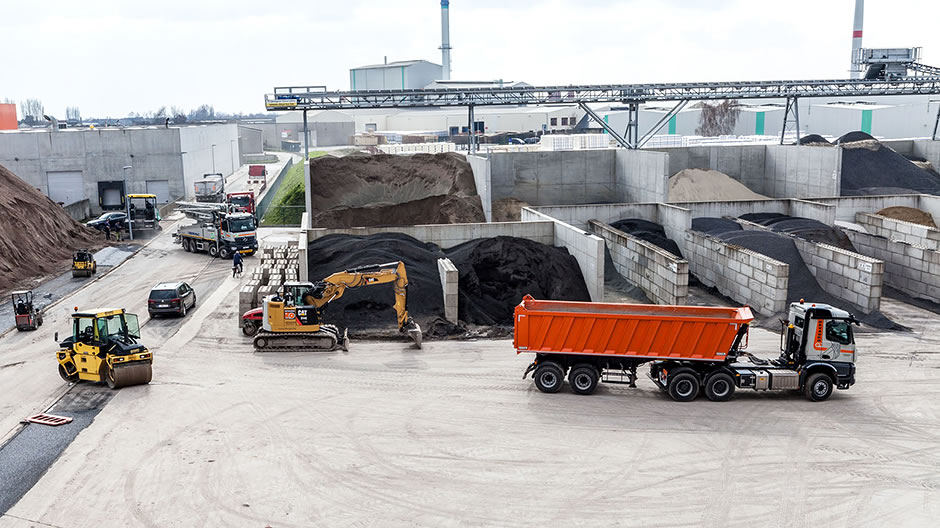
Devagro sees sustainable working practices as a matter of respect: the roof of the building is equipped with solar panels and the new location not too far from the Leie river is also no coincidence. "Desselgem lies on the future Seine-Scheldt canal project. As soon as it is completed, ships of up to 4500 tonnes will be able to navigate the Leie, compared with the present 2500 tonne limit and thus we will be able to remove more trucks from the road that would ordinarily transport our raw materials," explains Ignace Degezelle. His company already transports 300,000 to 400,000 tonnes annually via the waterway, as it is the best solution in ecological and logistical terms. And since the introduction of kilometre-based taxation on trucks in Belgium, Devagro saves a lot of money by transporting goods on the waterways.
"Of course, the efficiency of the Arocs also plays a role in our overall environmentally-friendly approach," Ignace Degezelle continues. From the very beginning, Devagro made a decision to only drive vehicles which bear the three-pointed star. "When I entered the construction industry, I was a textile engineer and had no experience in the construction domain. My father-in-law gave me a good piece of advice: 'Reliable machines and trucks are hugely important. Also choose Mercedes-Benz and the Ghistelinck Autobedrijven dealership.' A recommendation which I've always avidly followed," smiles Ignace Degezelle. He, too, firmly believes that the dealership's owner coming from West Flanders is a guarantee for top-quality service. He knows: "if a truck comes to a standstill, so too does an entire construction site." After being in operation for four to six years, the company's vehicles are replaced – and their residual value remains high.
The excellent off-road capabilities of the Arocs are a real plus point for Devagro. As the company doesn't just repair existing roads, but also builds new ones, their trucks are often under way in tough terrain. "And at the same time, with the ride quality which comes close to that of a truck for road use. What's more, the new engines have further reduced the consumption. That's important to us, and not just in financial terms, but also because we can better achieve our environmental targets," affirms Xavier Degezelle.
Devagro tends to opt for "Hybrid" vehicles which can be used both as towing vehicles and as regular tippers or concrete mixers. That improves the flexibility of the company's very diverse fleet. "Our fleet comprises predominantly 6x4 vehicles, but we do also have a number of 6x6 and 8x4 versions. These are used as tippers, tractor units with tipper semitrailers, concrete mixers and tractor units with concrete mixers. What's more, we also have an Arocs with concrete pump and two tried-and-tested Actros tractor units which tow our low-loaders for the transport of our construction machinery," Yves Degezelle continues.
By using frugal and environmentally-friendly trucks, Devagro was already well-prepared for the heavy-goods vehicle toll. Interestingly, Ignace Degezelle doesn't see the toll as such a bad thing: "For one thing, our road network is in urgent need of improvement and renovation, and the means to do that will have to be generated in a new way. But moreover, the tax on heavy-duty haulage firms should also be an incentive to actively seek better use of their fleet and potentially to look into alternative methods for transporting goods. And in such a system, the foreign trucks can then also be better included in financing the work. This approach may also help to develop a toll system which allows us to better distribute the flow of traffic."
Photos: Dirk Willemen



Comment
Please log in to post a comment.
No comments yet